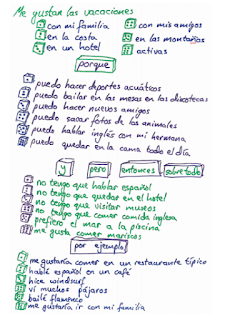Ever wondered what teaching languages was like 20 years ago?
Every so often, like the sword of Gryffindor, or a slightly unpredictable Halley's comet, an old CD Rom appears in our house. Often disappearing again ("I remember I put it in a safe place") before a computer capable of playing it can be found. It is the old Open University MFL PGCE materials. On it is video of me teaching in 2002.
I mentioned in an earlier post that Ann Swarbrick brought an OU/BBC film crew for a "model lesson". It was with a Year 8 class, in their second year of Spanish.
 |
| OU resource showing a mock-up of what ended up on the board |
 |
| Adding pupils' contributions to the sentence tree |
The photo is a still from the video, and the picture above is the OU's mock-up of what ended up on the board. You can see the OU have kept the "dance totally naked" that one pupil came up with. In fact what he said was, "Me gustan las vacaciones con amigos porque puedo hacer algo, por ejemplo puedo bailar completamente desnudo alrededor de una fogata con una cabra." Which brought the activity to an early end. It was cut from the video on the CD Rom, but I know that Ann Swarbrick enjoyed showing it at conferences. (No google translate in 2002. This was chunks that he knew or had asked for in previous lessons.)
Anyway, that brought this stage of the lesson to a hasty close.
Then we went on to the connectives dice activity described in the second half of this post. We worked on developing an answer, using dice to force us to extend using and, but, so, because, especially, for example according to the throw of the dice. This was modelled by one pupil for the class, and then they worked in pairs to practise. I was struck, watching this again, by the way I insisted they bring in some coherence (despite the random element) by picking just 3 or 4 infinitives to use. I thought I had only started to do this recently, as a tactic to make answers focus on developing specific ideas.
 |
| OHP Acetate |
Then we moved on to another dice game, again very similar to one described in this recent post. It's written on an acetate and projected on the OverHeadProjector. Pupils worked in pairs, rolling the dice to create sentences, evaluating if what they were saying was logical and coherent, or not. It uses can / have to + infinitive in the same way I do now. It's interesting to see this early example. And to see my Spanish was still quite Mexican with things like quedar/quedarse. (You can hear this in the accent on the video too.)
We then played a football game on the board. The class were in two teams, alternating to extend an answer by following on from the previous pupil, using connectives to take the ball off the other team. Impossible to explain, but I remember I used to do it a lot.
The medium-term planned outcome was a piece of writing, but most of the lesson was about speaking and extending answers orally. It had the same balance between random and coherent that I use with my current Year 8 classes. The random element means that thinking about what to say doesn't stand in the way of producing lots of fluent language. The coherence and organisation comes next.
The pupils had a high level of using their Spanish in the activities, using the resources to give extended answers about Holidays. But they also interacted in Spanish with me throughout, even when we got on to discussing the success criteria for the piece of writing they were going to do. I had forgotten how good they were at communicating.
This was in the days of the written Coursework GCSE. This meant extending answers and developing ideas was a new priority. These pupils went on to get caught up in the uncertainty of whether they had to take a language for GCSE or not. And also got mixed up in a grading fiasco associated with the changing nature of the cohort being entered. I might tell that story in another post one day...

No comments:
Post a Comment